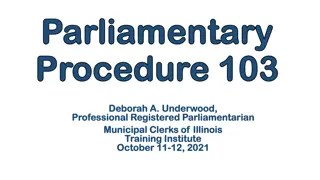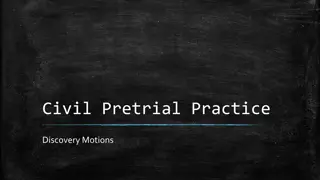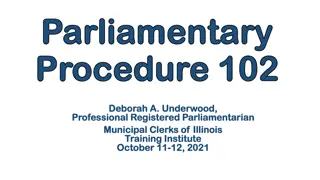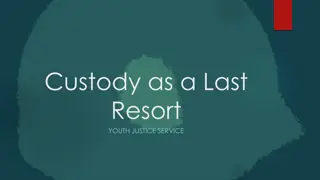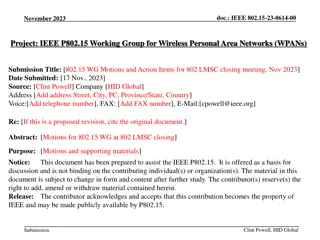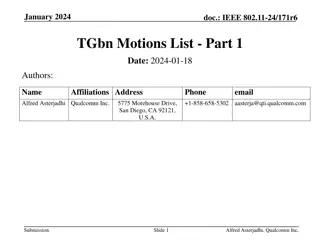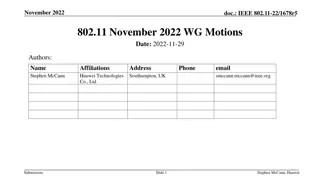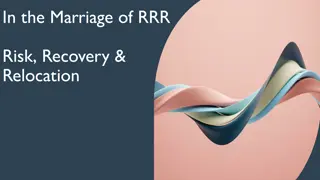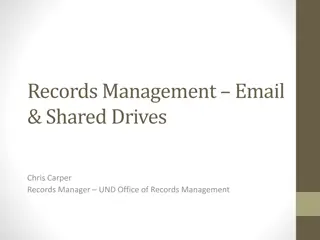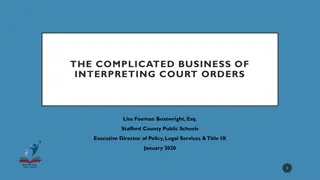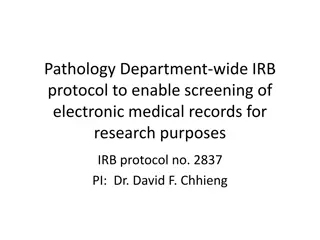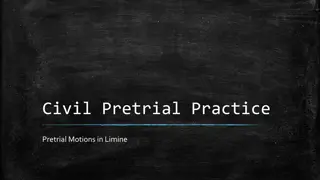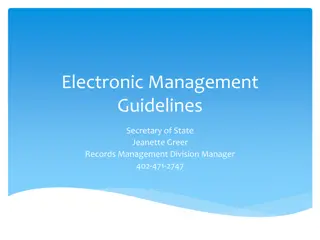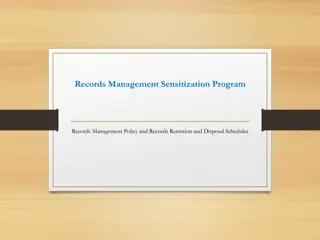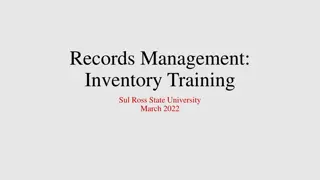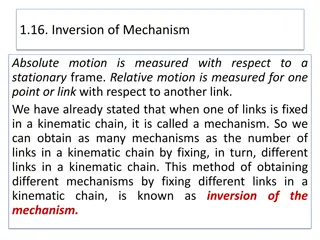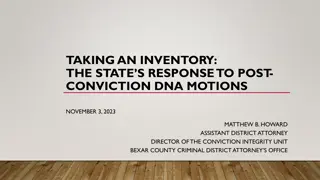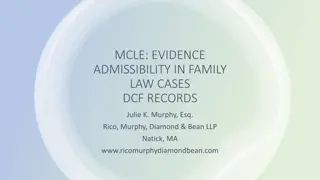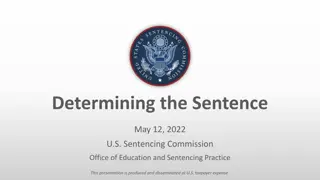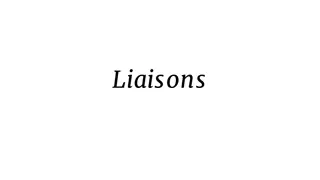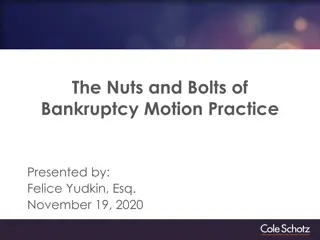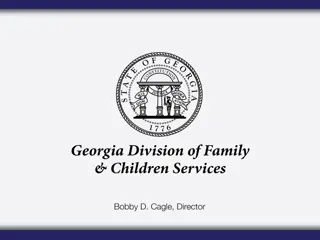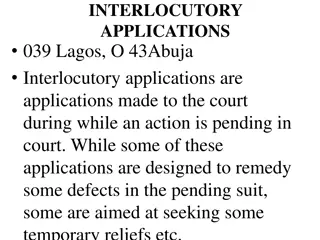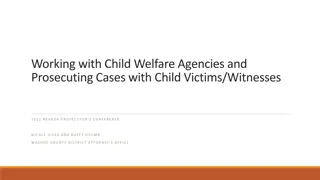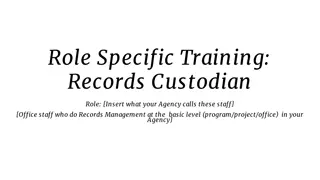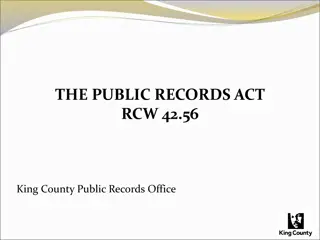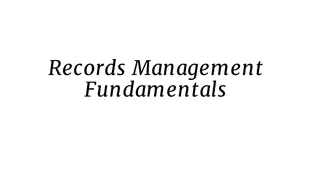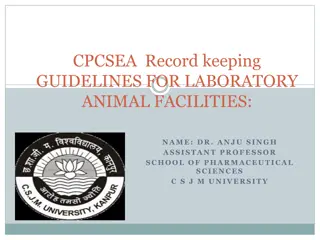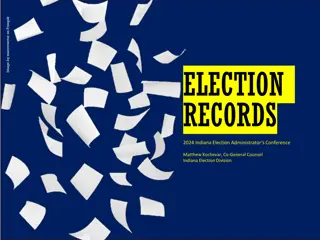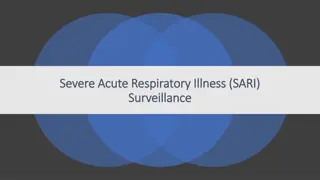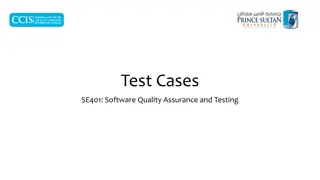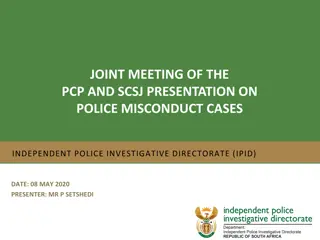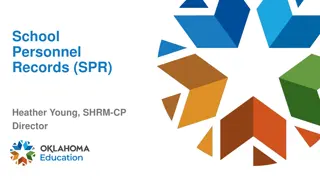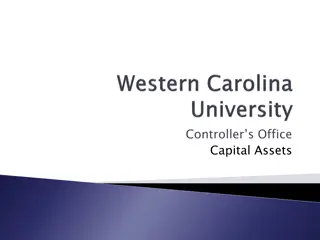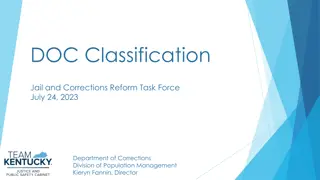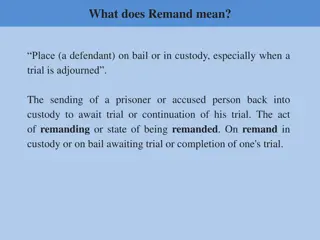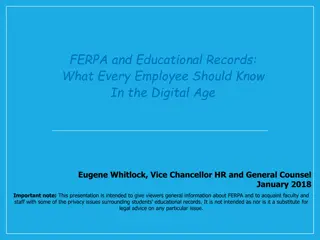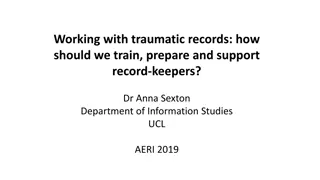Understanding Motions Practice and Obtaining Records in Child Custody Cases
Explore the process of motions practice in child custody cases, including obtaining various records such as court, DCF, education, medical, and more. Learn about important documents, DCF records, and the basis for objecting to certain requests by DCF when representing a minor in court proceedings.
Download Presentation

Please find below an Image/Link to download the presentation.
The content on the website is provided AS IS for your information and personal use only. It may not be sold, licensed, or shared on other websites without obtaining consent from the author. Download presentation by click this link. If you encounter any issues during the download, it is possible that the publisher has removed the file from their server.
E N D
Presentation Transcript
Motions Practice & Obtaining Records Stacy Schleif, Esq. Amir Shaikh, Esq. Name Name, Esq Title Date cca-ct.org
Obtaining Records Court records DCF LINK records Education records Medical records Drug treatment records Another party s records cca-ct.org
Court Records Application for Order of Temporary Custody Social worker affidavit Neglect petition Summary of Facts Social Study Status reports Psychological and/or Psychiatric Evaluation reports Motions cca-ct.org
Important DCF Records Investigation Protocol LINK record (running narrative) Structured Decision-Making tools Case Plan Multi-Disciplinary Evaluation (MDE) reports Administrative Case Review (ACR) reports Service provider reports cca-ct.org
What documents are part of the record for purposes of an OTC trial? cca-ct.org
OTC Practice/Documents Statements of child to mandated reporter are admissible. CGS 46b-129(g) Affidavit is subject to objection of any party, either in whole or in part. Documents are subject to applicable Rules of Evidence and Practice Book provisions. Evid. Code 1-1 cca-ct.org
You represent a 14 year-old. DCF is asking court to take judicial notice of a prior case that involved injury to your client s sibling. DCF is also asking to preclude evidence that contests facts from the previous case. Your client wants to go home. Do you have a basis to object to these requests by DCF? cca-ct.org
Court may take judicial notice of a previous case between the same parties, and ordinarily, a party may challenge facts from the previous case. Judicial notice not taken of the fact of injury causation; rather judicial notice taken of other decision, which included factual findings. Collateral estoppel prohibits re-litigating those findings. In re Jah za G, 141 Conn.App. 15 (2013) cca-ct.org
Motions to Strike / Hearsay Exceptions Statement to mandated reporter Business duty to report (business records exception) Statement for medical treatment Spontaneous utterance Not offered for truth, but as evidence of knowledge (verbal) beyond what is developmentally appropriate cca-ct.org
Six year-old child client made statements to in-home service provider that her guardian touches her at night, gets in bed with her, and spits glue. She did not repeat the disclosure to the DCF SW at a school interview. Can you get statements into evidence at OTC trial? cca-ct.org
At OTC trial, credible hearsay evidence re: statements of the child made to a mandated reporter or to a parent may beadmitted upon a finding that the statement is reliable and trustworthy and that admission is reasonably necessary. Statement by a mandated reporter under oath may be admitted without the need for the mandated reporter to testify provided it: (1) was provided at the preliminary hearing and promptly upon request to any counsel; (2) reasonably describes the qualifications of the reporter and the nature of his contact with the child; and (3) contains only the direct observations of the reporter, and statements made to the reporter that would be admissible if s/he were to testify and any opinions reasonably based thereupon. If a party gives notice at the preliminary hearing that he intends to cross-examine the reporter, the reporter shall be made available for such examination at the contested hearing. See CGS 46b-129(g) cca-ct.org
Statements of a Child In re Tayler F., 296 Conn. 524 (2010) Testimony re: child s statements regarding neglect permitted through residual hearsay exception where child unavailable Unavailability established by testimony regarding negative impact/ psychological harm that testifying will have on children Determination must be based on evidence specific to child & circumstances, not generalized presumption that testifying is per se harmful. cca-ct.org
Tender Years Exception Statement of child under 13 at time of statement, re: sexual assault/misconduct or physical abuse by parent/guardian/ authority figure, is admissible if: Court finds, after hearing, that statement is trustworthy (given timing, content, etc.); Statement was not made in preparation of legal proceeding; and Child either testifies and is subject to cross-examination (in-person or video), or is unavailable as witness. Conn. Code. Evid. 8-10 cca-ct.org
Tender Years Exception, cont. Statement of unavailable child is admissible if: Independent, corroborative evidence of alleged act that does not include hearsay; and Statement was made prior to defendant s arrest or commencement of juvenile proceedings connected to act. cca-ct.org
Tender Years Exception, cont. Statement may not be admitted unless proponent of statement makes known to adverse party: Intention to offer statement; Content of statement; Approximate time, date, and location of statement; Person to whom statement was made; and Circumstances that indicate trustworthiness Copy of statement must be provided in advance of proceeding. cca-ct.org
DCF removed 14 & 15 year-old siblings from home due to father drug trafficking & concerns of physical abuse. Both want to go home, but want to be sure father will not be there, and that mother is able to keep home safe. Mother says she will make motions with court if you do not advocate for her children to return home. Can she motion for this? What do you do? cca-ct.org
Issues to Consider Obligations of child s counsel oCGS 46b-129a - Counsel for the child shall act solely as attorney for the child oRPC 1.14 Client with impaired capacity; maintain normal client-lawyer relationship Conflict-free representation oIn re Christina M. Standing of parent or child to raise each other s legal issues oIn re Christina M., 280 Conn. 474 (2006) oIn re Lyric H., 114 Conn. App. 582 (2009) cca-ct.org
Childrens Representations In re Christina M., 280 Conn. 474 (2006) Trial court was not required to appoint separate GAL because no record that it knew or should have known conflict existed between what children wanted and what attorney advocated for. Same test as used in criminal context to determine whether trial court had duty to inquire if conflict existed: 1) Timely objection at trial re: conflict; or 2) Court knew or reasonably should have known that particular conflict exists. High threshold before court must affirmatively inquire whether there s a conflict cca-ct.org
Child client wants to live with godmother, i.e. friend from church. DCF gives you run around. Your client says DCF told her that her mom needs to approve the placement. Can you make a motion for placement with a person who is not a parent or relative? cca-ct.org
Prospective placement does not have to be a relative. Court cannot order a particular home to be licensed. Court can review DCF s actions taken in consideration of home. At preliminary OTC hearing, DCF can be ordered to review and report appropriateness of proposed placements. (Statutory 30-day requirement in CGS 46b-129 refers only to relatives) Parent does not have veto power over placement decisions. Remember: DCF Licensing answers to DCF Leadership. cca-ct.org
Child client informs you that adult family members caring for him said he has to be at court tomorrow to testify. Your client is nervous about testifying in front of his mother. What can you do? cca-ct.org
Procedures for children to testify: Practice Book 32a-4 Party seeking to introduce testimony must file motion seeking permission. Adult that child feels comfortable with may be permitted to remain as support. Accommodations can be made, e.g. counsel to stay seated while questioning, or submit questions to judge to ask. Children may testify in chambers, via agreement of the parties. Testimony to be summarized & shared on record afterwards. Parent may be excluded from if child would be intimidated, and trustworthiness of child seriously would be called into question, as shown by clear and convincing evidence. cca-ct.org
What rights do youth have to appear in court? Is a motion required? cca-ct.org
Child or youth who is legal party to proceeding, has the right to be present. Each court has different practice. In some courts, prevailing practice is to send notification to the court that child is going to be present. Notification need not be phrased as request or motion. cca-ct.org
Childs Appearance in Court Permanency Hearings At a permanency hearing . . . the court shall: (A)(i) ask the child or youth about his or her desired permanency outcome; or (ii) if the child or youth is unavailable to appear at such hearing, require the attorney for the child or youth to consult with the child or youth regarding the child's or youth's desired permanency outcome and report the same to the court Conn. Gen. Stat. 46b-129 (k)(4) cca-ct.org
Childs Appearance in Court Permanency Hearings, cont. At permanency plan hearing, court shall ensure there is consultation with child or youth in age-appropriate manner. This can mean: Court ensures that lawyer consulted with youth; or Judge consults with youth when present in court Child s attorney should always file response to permanency plan, indicating, among other things, the last time he/she saw the child. Sec (b): For good cause shown, child or youth who is subject of hearing may be excluded from courtroom." Practice Book 32a-5 cca-ct.org
You represent a teen client coming out of detention. He is on a waiting list for residential treatment, and temporarily placed at a STAR home. It s unclear if he needs residential level of care You do not want him to lose regular contact with family or school. Do you file a motion? cca-ct.org
Consider viability of alternative placements Talk to clinical director at STAR home about current presentation and placement recommendations. Review initial recommendation for credibility. Review mental health records, LINK record, CANS. Review recommendation with DCF RRG and come to agreement / resolution. File for In Court Review re: basis of DCF s placement decision. Note: Youth is still entitled to protection of educational stability statute, even in residential. cca-ct.org
You represent a 17 year-old client living in group home. She struggles in school and is unlikely to be ready for community college or a post-secondary school/ vocational program. She has no one to support her and you think DCF will cut off support at age 18. You don t want her to fall through the cracks. What should you do? Do you need to file a motion? cca-ct.org
A youth who is committed to DCF and has reached age 18 may remain in the care of DCF, by consent of the youth and provided that he/she/they has not reached age 21, if the youth is: Enrolled in a full-time approved secondary education program or an approved program leading to an equivalent credential; Enrolled full time in an institution which provides postsecondary or vocational education; or Participating full time in an approved program or activity designed to promote or remove barriers to employment. The Commissioner may waive the provision of full time enrollment or participation based on compelling circumstances. CGS 46b-129(j)(5) cca-ct.org
Case Planning: Federal and state law entitle youth to comprehensive & appropriate adolescent discharge plan. If not included, can challenge plan in court as inadequate & seek orders to support plan, extend DCF eligibility. Education: Ask for educational surrogate Ask for DCF educational specialist to review records and advocate for IEP with transition goals cca-ct.org
You represent two teenage boys. Both have been in foster care for 3 years. The case is scheduled for a permanency plan hearing next week. DCF s plan is TPR and adoption. Parents and boys all object to TPR. Both boys are mature and articulate in discussions. Additionally, you don t think TPR is best permanency plan, and are not convinced that DCF made reasonable efforts. DCF files its plan for the Motion to Review Permanency ( MRP ) date. What strategies/approach can you take at the permanency plan hearing? cca-ct.org
Present argument/evidence of: Right to a permanency plan that is in the best interests of the child see 46b-129(k) Right of children over 12 to agree to adoption Boys position - consider motion to have boys testify Long-term nature of current placement Consider witnesses to testify re: therapeutic benefits of contact with mom, e.g. therapist, SW, mentor, teacher Consider value of independent consult Can challenge reasonable efforts, unless there was previous finding that reasonable efforts no longer required Review previous perm plan findings for possible support cca-ct.org
Client and mother recently lost trial on DCFs petition to terminate parental rights. Mother and child are very bonded, and mother filed an appeal of TPR. There has been no indication or evidence that visitation or contact is not in child s best interest. Can you preserve visitation pending a resolution of the ultimate appeal, via motion? Does an appeal automatically stay the implementation of TPR? Do you have to file a motion to stay TPR, or visitation, or both? Can mother be heard re: the best interests of the child, and the bond between mother/child or child/sibling? cca-ct.org
Post-Termination Motions File Motion for Stay of Judgment in trial court CT Rules Appellate Procedure 61-12 Unless stay of execution is obtained, termination judgment extinguishes parent s visitation rights oIn re Elijah J., 2012 WL 5447897 (Sup. Ct. Oct. 4, 2012) discussing factors to be applied in determining motion for stay of TPR ruling and for visitation pending appeal, under CT Rules App Procedure 61-12 File Motion for Continued Visits, in BIOC Ask for evidentiary hearing on visitation issue cca-ct.org
Child retains independent right to seek visitation, consistent with best interests of the child Court not prepared to assume that welfare of children is best served by a narrow definition of those whom [it] permit[s] to continue to manifest their deep concern for [their] child[ren] s growth and development Michaud v. Wawruck, 209 Conn. 407, 415 (1988) Lamenting that visitation between parent and child was not permitted after termination decision and pending outcome of appeal. In re Juvenile Appeal (Anonymous), 177 Conn. 648 (1979) cca-ct.org


